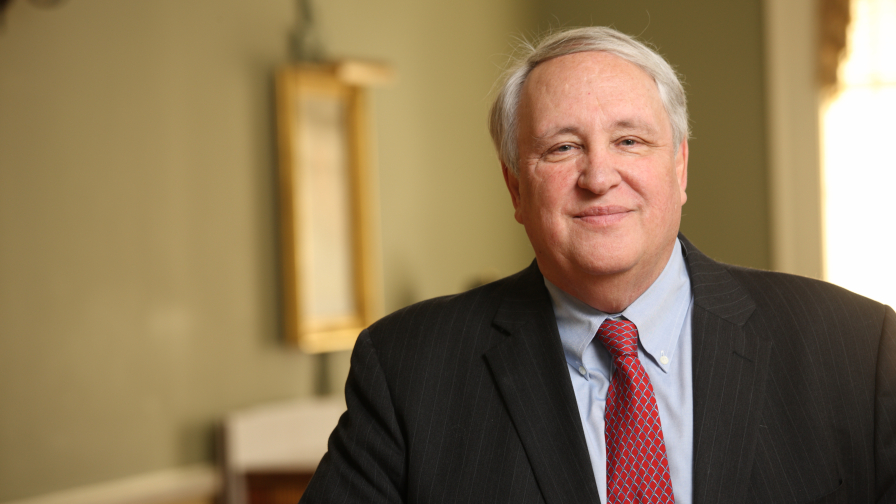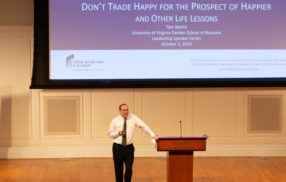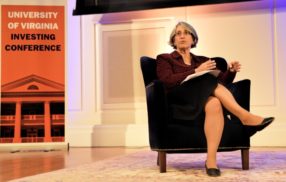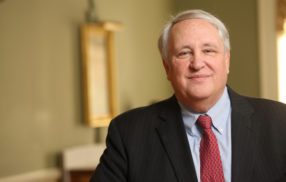
UVA Darden Economists’ 2020 Economic Forecast: Will the Good Times Keep Rolling?
By Dave Hendrick
With U.S. equity markets booming, unemployment near record lows and inflation seemingly held firmly in check, large swaths of the U.S. economy were the picture of health in 2019. Beneath the exuberance, however, the fundamentals driving the recent growth appear unlike past booms, and may not be sustainable for the long-term.
At their annual series of economic forecast events, University of Virginia Darden School of Business Professor Alan Beckenstein and economist Nick Sargen offered their assessment of a momentum market underpinned in part by consumer spending and Federal Reserve action.
“We are basically totally dependent on consumption expenditures,” Beckenstein said. “That is not a good omen for the long run.”
Although the Dow Jones Industrial Average returned roughly 24 percent in 2019, Beckenstein said a number of underlying factors led him to believe the U.S. economy was in “the wrong space — and troubles may be on the horizon because of it.”
Beckenstein, a self-described political independent, said the Tax Cuts and Jobs Act of 2017 had exacerbated income inequality and deficits in the U.S. While the new law was pitched in part as a boon to business investment, Beckenstein said the promised results had not come to pass. Moreover, with the Federal Reserve continuing to cut interest rates despite a seemingly strong economy, the Fed has little policy space to maneuver should an economic crisis manifest.
In short, said Beckenstein, there is a plague of short-term thinking affecting those driving policy decisions in the U.S.
Beckenstein said the interest rates of near zero and high government spending put in place in the midst of the Great Recession were necessary to save the economy but problematic for the long-term.
“We need to adopt strong, long-run policies where productivity and economic growth are our drivers,” Beckenstein wrote in a note accompanying his forecast. “Short-term stability is needed but should not drive the major decisions of our future.”
Beckenstein also expressed concern regarding interest President Donald Trump has displayed in reducing entitlement spending. After cutting taxes and increasing spending, Beckenstein said it seems likely the current administration may point to entitlement spending as the cause of soaring debt and deficits. Any attempt to push a “hardline” position on Medicare and social security spending could shake consumers and incite lower expectations in the economy, he said.
Looking ahead, Beckenstein said much of the year leading up to the U.S. presidential election felt “baked in.” For the fourth quarter of 2019 through the end of the third quarter of 2020, he predicted real GDP growth of 1.9 percent, core inflation of 2.3 percent and an average unemployment rate of 3.5 percent. Beckenstein put the odds of a recession by the last half of 2021 at 40 percent, with numerous potential sources of shock. Notably, Beckenstein and Sargen offered their outlooks on the year ahead as the economic impact of the coronavirus was just beginning to offer some signs of unsettling global markets.
Beckenstein also offered the scorecard on the previous year’s forecast, with his prediction of real GDP growth of 2.4 percent higher than the actual 2.08 percent, a forecast of core inflation of 2.4 percent just above the actual 2.32 percent, and the average unemployment rate of 3.9 percent higher than the actual 3.7 percent.
Will Equity Markets Continue to Boom?
Sargen, who tailors his forecast more narrowly toward equity markets, noted the remarkable run-up in stocks in 2019, with the Standard & Poor’s 500 Index up more than 30 percent for the year, spurred on by U.S. monetary policy and the pause in the U.S.-China trade war.
Sargen noted the historic nature of the current bull market, which is matched in run-up only by the 1990s and peerless in duration at 129 months and counting.
With improving market conditions, a Federal Reserve seemingly content to keep interest rates low and the U.S.-China calling something of a trade truce, Sargen said fears of an impending recession have largely abated.
While markets rejoiced following the completion of the “phase one” agreement between the U.S. and China, Sargen cautioned that the two super powers were still in the early rounds of a “heavyweight fight,” with thorny issues such as technology transfer and industry subsidization left to be fought over at a future date.
Richly valued equity markets will likely see modest gains in the year ahead, Sargen predicted, and investors should not expect another 2019.
Sargen wrote, “While we do not foresee an imminent end to the bull market in equities or rising bond yields, market returns are likely to be sub-par in the coming year considering that equity valuations are stretched, corporate profit growth has stalled and the outlook for the U.S. elections is uncertain.”
Indeed, the U.S. elections may be the real wild card for the year ahead, Sargen said. Noting that the markets seem to have paid “zero attention” to the contest so far, the economist suggested that could change depending on how the eventual contest shapes up.
The University of Virginia Darden School of Business prepares responsible global leaders through unparalleled transformational learning experiences. Darden’s graduate degree programs (MBA, MSBA and Ph.D.) and Executive Education & Lifelong Learning programs offered by the Darden School Foundation set the stage for a lifetime of career advancement and impact. Darden’s top-ranked faculty, renowned for teaching excellence, inspires and shapes modern business leadership worldwide through research, thought leadership and business publishing. Darden has Grounds in Charlottesville, Virginia, and the Washington, D.C., area and a global community that includes 18,000 alumni in 90 countries. Darden was established in 1955 at the University of Virginia, a top public university founded by Thomas Jefferson in 1819 in Charlottesville, Virginia.
Press Contact
Molly Mitchell
Senior Associate Director, Editorial and Media Relations
Darden School of Business
University of Virginia
MitchellM@darden.virginia.edu







